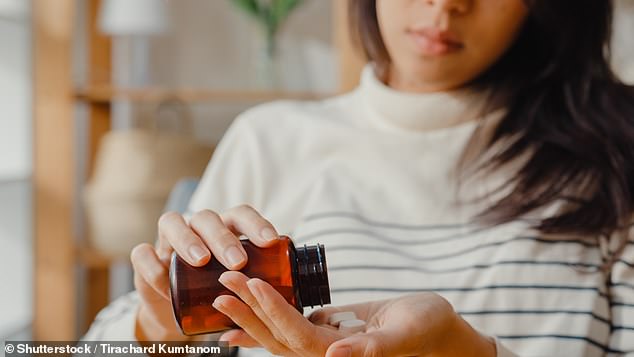Placenta jab could offer hope to those suffering from chronic form of cystitis
An injection of placental tissue could offer hope for people with a chronic form of bladder infection.
The treatment led to a threefold reduction in pain and urinary symptoms in patients with interstitial cystitis, a condition that affects around half a million Britons, nine in 10 of whom are women.
Interstitial cystitis, also known as bladder pain syndrome, is a poorly understood condition in which the main symptoms are intense pelvic pain and difficulty urinating. Those affected may have a sudden, strong urge to urinate or urinate more often than normal, often waking up several times. times during the night.
Other symptoms may include urinary incontinence and blood in the urine, and the condition can have a long-lasting impact on quality of life.
The main symptoms of interstitial cystitis are intense pelvic pain and difficulty urinating (stock image)
Unlike other forms of cystitis, which are caused by a bladder infection and often resolve without treatment, the cause of interstitial cystitis is unclear.
Theories include damage to the bladder wall, which can cause urine to irritate the bladder and surrounding nerves. Another suggestion is that it arises as a result of damage to the pelvic floor muscles or because the immune system causes an inflammatory response.
Treatments include over-the-counter and prescription pain relievers, and medications to control the urge to urinate.
Sometimes surgery is suggested if there is damage to part of the bladder or if other treatments don't work; For example, ulcers in the bladder can be sealed with laser therapy.
But there is no conclusive evidence that these existing treatments work.
The new approach involves injecting amniotic fluid from the placenta into the bladder muscle to regenerate damaged tissue and reduce inflammation.
The amniotic membrane, the outer layer of the placenta, is rich in natural healing substances that trigger new cell growth.
It is already used successfully in dressings for chronic wounds such as leg ulcers. The membrane comes from donated human placental tissue that is sterilized and then turned into a powder before being converted into liquid form.
In a clinical trial at Wayne State University School of Medicine, Detroit, USA, ten patients who had had interstitial cystitis for twelve years received several injections into the bladder muscle under general anesthesia – after three months their symptoms had improved significantly, as measured by a screening instrument developed to evaluate pain.
The average scores decreased from 37.4 before treatment to 12.2 after three months.

Treatments include over-the-counter and prescription pain relievers, and medications to control the urge to urinate (stock image)
“This corresponded to a significant improvement in physical and mental quality of life and there were no side effects,” the researchers reported in the journal International Urology and Nephrology.
A larger study is now underway at Case Western Reserve University in Ohio, USA, involving 100 patients who will receive either injections of the placental material or placebo injections at 20 sites in the bladder.
Commenting on the research, Professor Raj Persad, consultant urologist at Bristol Urology and Southmead Hospital, said: 'This preliminary study offers hope to anyone with chronic pelvic pain due to interstitial cystitis.
'It's not clear to me how it works, but the pain scores for this terrible disease that 'paralyzes' people are improving significantly. I am eagerly awaiting the results of the larger trial.'
Injections of 'Botox' may relieve symptoms of interstitial cystitis (or bladder pain syndrome), according to a new study in the journal Urology Research & Practice.
More than forty people who had not responded to other treatments were given injections in the bladder and then followed for nine months. About 41 percent had a 'good' response and 52 percent an 'intermediate response' – while 7 percent experienced no improvement, doctors at Tabriz University of Medical Sciences in Iran found.
Botulinum toxin in the pricks is thought to reduce tension in the bladder muscles, thus relieving pain. Relaxing the muscle can also reduce the frequency and urgency.
Secrets of an A-List Body
This week: Sarah Paulson's waistline
Sarah Paulson, 49, was guest of honor at a recent gala, where she wore a yellow outfit that hugged her waist.
The American actor has said that “being slim doesn't come naturally to me,” and she works out daily with a trainer to stay strong and toned, doing bodyweight exercises and cardio.

Sarah Paulson, 49, was guest of honor at a recent gala, where she wore a yellow outfit that hugged her waist
WHAT TO TRY: The 'dead bug' will shrink your waist and train your core muscles. Lie face up, reach your arms toward the ceiling and lift your legs so that your knees are bent at 90 degrees, with your feet facing the wall.
Slowly extend your left leg straight and your right arm behind your head until both are a few inches off the ground.
Return to the starting position and repeat with your right leg and left arm. Perform three sets of 15 repetitions, three times a week.
